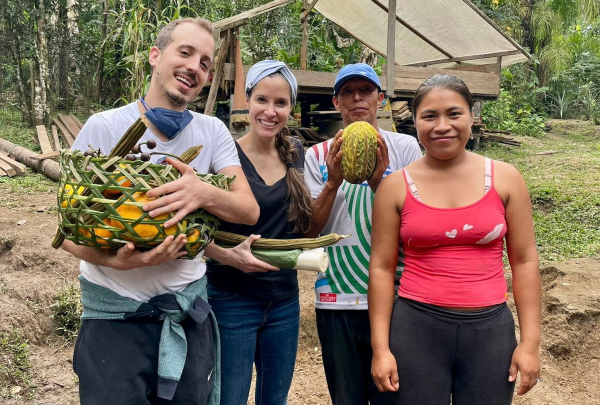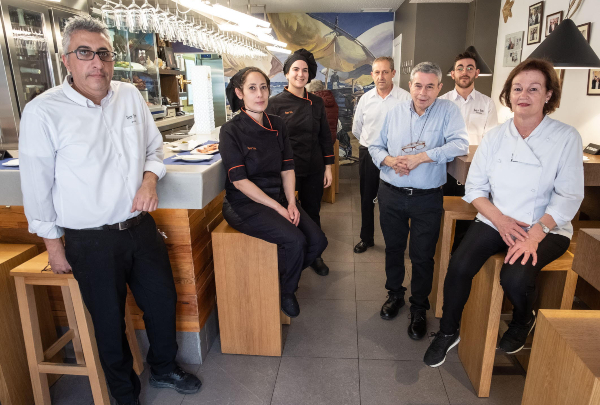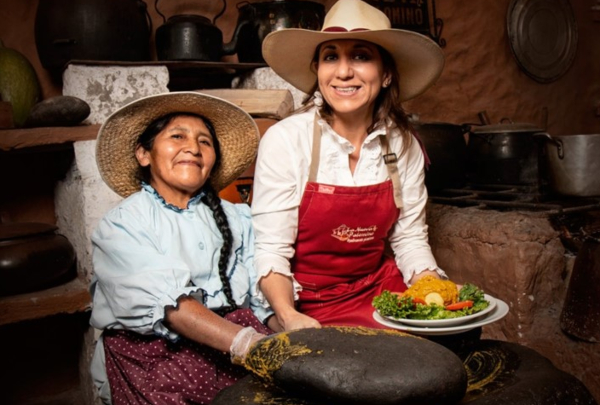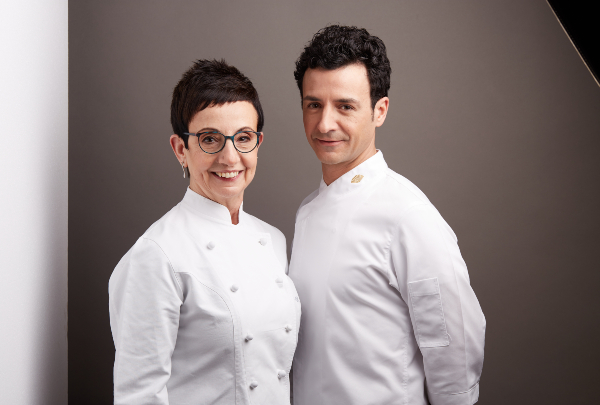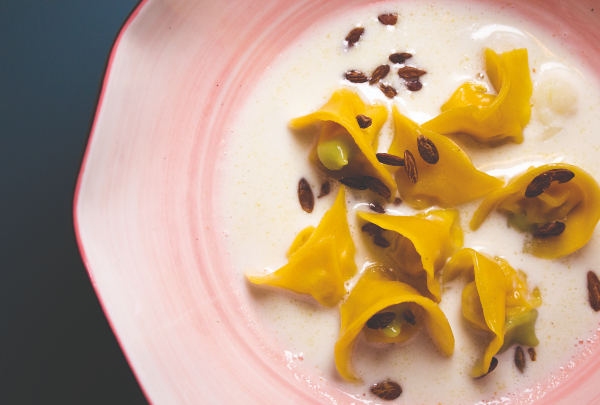Interview
Fatmata Binta: “Fulani women tell stories and express their joys and their despair through food”
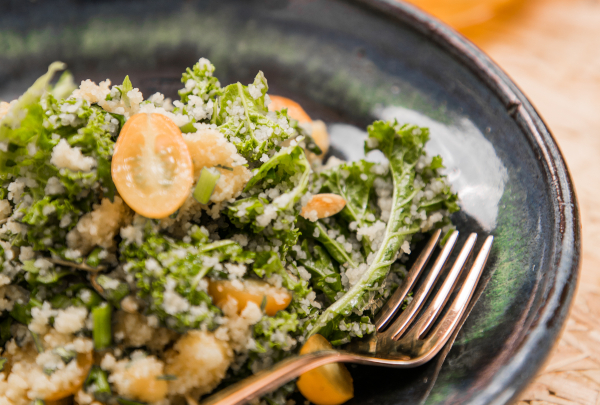
The stories told by Fatmata Binta recipes are about teenage years devastated by a war, the cultural wealth of her ancestors, and a firm belief in the power of change through food. This African chef will be with us at FéminAs, but we talked to her beforehand.
Slowly but surely, culinary Africa is raising its voice. They are not legion as yet, but more and more names in African cuisine are moving beyond their borders. And the most stimulating part of this is that many of them are female names, such as Fatmata Binta's. With this chef who was born in Sierra Leone but had to leave home due to one of the most savage conflicts in the recent history of Africa, nomad cuisine is on the up and up, not only for its gastronomic value, but also in view of its sustainability.
Binta's ancestors are the Fulani "Africa's largest nomad people", a tribe that mainly grazes cattle and has had to adapt its cooking to the perpetual movement required by the animals. “In a Fulani community we eat less because of the constant migration, and we home in on what each environment can provide us with. Most of our ingredients are sun-dried, and so they're ready to be taken away whenever necessary. That way nothing is wasted", explains Fatmata Binta, giving us a clue to the Fulani mindset, and why the nomad culture is one of the planet's most sustainable. A lesson the world ought to take note of.
Fatmata does this, and demonstrates it to our sedentary societies through the Fulani Test Kitchen, an initiative seeking to convey the philosophy of the Fulani lifestyle and cookery with gastronomy pop-ups to delve into sustainable menus featuring 70% of vegetables from their own plantations and a clear 0 wastage policy. And an essential part of the teachings of this chef's recipes is knowledge of a superfood, the ancestral cereal fonio.
“Personally, I have a special connection with fonio. I lived through a brutal civil war as a teenager in Sierra Leone, and we had to flee to Guinea Conakry, to my ancestral home. Many of the foodstuffs available weren't enough for more than 100 people in a small village, and so my grandmother had to grow fonio to feed us, and agriculture was a great way to channel our teenage energy. So it's important for me to share its potential in talks to educate people in food safety". A potential that has an impact on many planes: growing fonio prevents desertification, it is gluten-free but has five times more fibre than rice, and it is also a key social activator in African communities, since "fonio represents, especially for women - who are the people growing it - security, strength, sorority and the possibility of making a contribution to society itself".
Women and food; women and gastronomy
The role of women in relation to food is a basic aspect of many cultures, and in African culture too, where cooking is also a space of liberty for the women. This is how Fatmata Binta recalls the women in her family: “I grew up in a community where women expressed their joys and their despair through food, and also their stories, fashion or cultural or festive events. One of my favourite memories is the women in my family cooking together for two days to celebrate a major community event. A lot of my passion for cooking stems from that experience".
But the reality of professional cooking is a far cry from Binta's female experience during her childhood. Although for generations it has been women who have taken charge of family cooking, haute cuisine is a space dominated by men. “Initially this was a real shock to me, but now it serves as motivation to do things even better", because - according to Binta - "this means that in my case I have to work ten times harder to gain the same recognition as a man".
And her work is not conceived as simply producing recipes, but understanding "food as a bridge between peoples and communities, a universal language in which we can all feel good". A vision of the act of eating which Africa's nomad culture summarises quite deftly: “as nomads, we in the Fulani tribe believe that eating on a mat on the ground helps establish the social structure of the group and of the family, and also spiritually because it helps you connect with others easily. On the mat you share the food and the experience facilitates dialogue, calmness ...".
Another lesson to be learned from Africa's gastronomy culture, a culture that is "ancient, but is new to a global world which is gradually discovering it, a very rich, unknown culture, and still a virgin culture in many aspects in rural areas".
Slowly but surely, culinary Africa is raising its voice. They are not legion as yet, but more and more names in African cuisine are moving beyond their borders. And the most stimulating part of this is that many of them are female names, such as Fatmata Binta's. With this chef who was born in Sierra Leone but had to leave home due to one of the most savage conflicts in the recent history of Africa, nomad cuisine is on the up and up, not only for its gastronomic value, but also in view of its sustainability.
Binta's ancestors are the Fulani "Africa's largest nomad people", a tribe that mainly grazes cattle and has had to adapt its cooking to the perpetual movement required by the animals. “In a Fulani community we eat less because of the constant migration, and we home in on what each environment can provide us with. Most of our ingredients are sun-dried, and so they're ready to be taken away whenever necessary. That way nothing is wasted", explains Fatmata Binta, giving us a clue to the Fulani mindset, and why the nomad culture is one of the planet's most sustainable. A lesson the world ought to take note of.
Fatmata does this, and demonstrates it to our sedentary societies through the Fulani Test Kitchen, an initiative seeking to convey the philosophy of the Fulani lifestyle and cookery with gastronomy pop-ups to delve into sustainable menus featuring 70% of vegetables from their own plantations and a clear 0 wastage policy. And an essential part of the teachings of this chef's recipes is knowledge of a superfood, the ancestral cereal fonio.
“Personally, I have a special connection with fonio. I lived through a brutal civil war as a teenager in Sierra Leone, and we had to flee to Guinea Conakry, to my ancestral home. Many of the foodstuffs available weren't enough for more than 100 people in a small village, and so my grandmother had to grow fonio to feed us, and agriculture was a great way to channel our teenage energy. So it's important for me to share its potential in talks to educate people in food safety". A potential that has an impact on many planes: growing fonio prevents desertification, it is gluten-free but has five times more fibre than rice, and it is also a key social activator in African communities, since "fonio represents, especially for women - who are the people growing it - security, strength, sorority and the possibility of making a contribution to society itself".
Women and food; women and gastronomy
The role of women in relation to food is a basic aspect of many cultures, and in African culture too, where cooking is also a space of liberty for the women. This is how Fatmata Binta recalls the women in her family: “I grew up in a community where women expressed their joys and their despair through food, and also their stories, fashion or cultural or festive events. One of my favourite memories is the women in my family cooking together for two days to celebrate a major community event. A lot of my passion for cooking stems from that experience".
But the reality of professional cooking is a far cry from Binta's female experience during her childhood. Although for generations it has been women who have taken charge of family cooking, haute cuisine is a space dominated by men. “Initially this was a real shock to me, but now it serves as motivation to do things even better", because - according to Binta - "this means that in my case I have to work ten times harder to gain the same recognition as a man".
And her work is not conceived as simply producing recipes, but understanding "food as a bridge between peoples and communities, a universal language in which we can all feel good". A vision of the act of eating which Africa's nomad culture summarises quite deftly: “as nomads, we in the Fulani tribe believe that eating on a mat on the ground helps establish the social structure of the group and of the family, and also spiritually because it helps you connect with others easily. On the mat you share the food and the experience facilitates dialogue, calmness ...".
Another lesson to be learned from Africa's gastronomy culture, a culture that is "ancient, but is new to a global world which is gradually discovering it, a very rich, unknown culture, and still a virgin culture in many aspects in rural areas".

